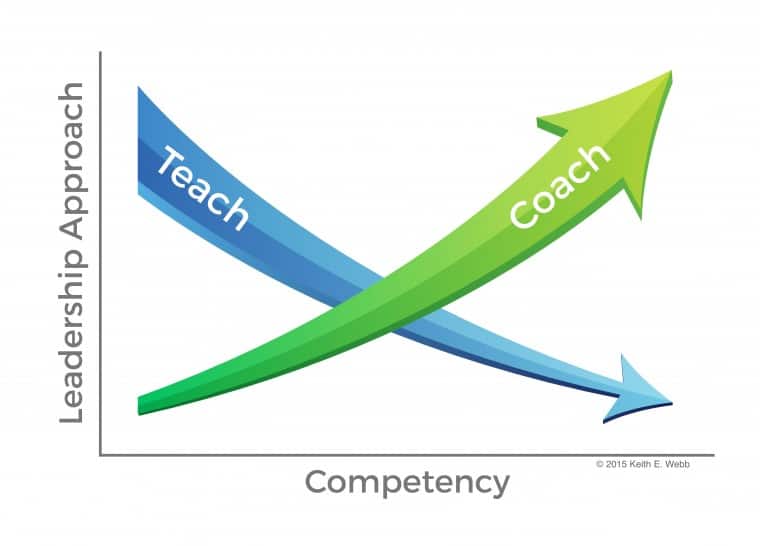Any time you are training others, it is important to know when to teach and when to coach. This is one of the most common questions we receive at Trainers Training events. Choosing the best approach for the situation helps you motivate and empower your new staff and volunteers for excellent results.
Keith Webb has written an excellent article about these two approaches. I will summarize his ideas in this post but please also read his complete article HERE.
Teaching and coaching are both important for the training relationship, but neither is best for every situation. In the Team Leader Training materials, we have sessions for both improving your teaching skills by using Adult Learning methods and improving your coaching skills.
When deciding which approach to use in a situation, ask yourself:
Is my trainee capable of this task?
Keith Webb clarifies… “Capable doesn’t mean perfect. And it doesn’t mean they do the task the way you would do it. Instead, the question asks, Have they been instructed on how to do the task? and Have they done the task before?”
If your trainee hasn’t done the task before, then teach them how to do the task, but if they are already capable of doing the task, then don’t teach them.
If you teach, when the trainee already knows how to do the task, you will demotivate your trainee and appear too controlling and disrespectful.
If they need further help to do the task differently, try coaching instead by asking questions.
- What part is unclear?
- What are you doing that is working? Not working?
- What have you tried so far?
Coaching with questions is often harder than we anticipate. Many of us are better at “telling” than we are at helping others come up with their own solutions.
To be a good coach we need to remember:
- It is often faster to do the task than to teach it. However, that short-circuits the trainee’s development. Take the time to teach well, but don’t do the work yourself if you have the opportunity to develop someone else.
- Organize well. Be prepared to do your best quality work. Know the sessions well and plan thoroughly for your time together with your trainee. Pray for him/her often.
- Train by doing tasks together. This also often takes more time. We sometimes get impatient during this process because it would be faster to do the work ourselves. However, if we don’t work through the process with the trainee, he/she can’t be successful.
- Use questions to offer help but do not re-teach. Our first inclination can be to say, “Here, let me show you again.” But rarely does the trainee need to be taught again from the beginning. It is usually a step in the middle somewhere that isn’t clear. It is better to ask, “What specifically isn’t clear?”
- Affirm progress. This is important. As the trainee works through the steps, we can observe growing competence in tasks. There will be opportunities to affirm small areas of progress. If we re-teach everything, we miss what the trainee can do well and the opportunity to affirm it.
Great trainers take the time to teach and ask questions so the trainees learn what they need to be successful in their jobs.
How do you determine when to teach and when to coach?




